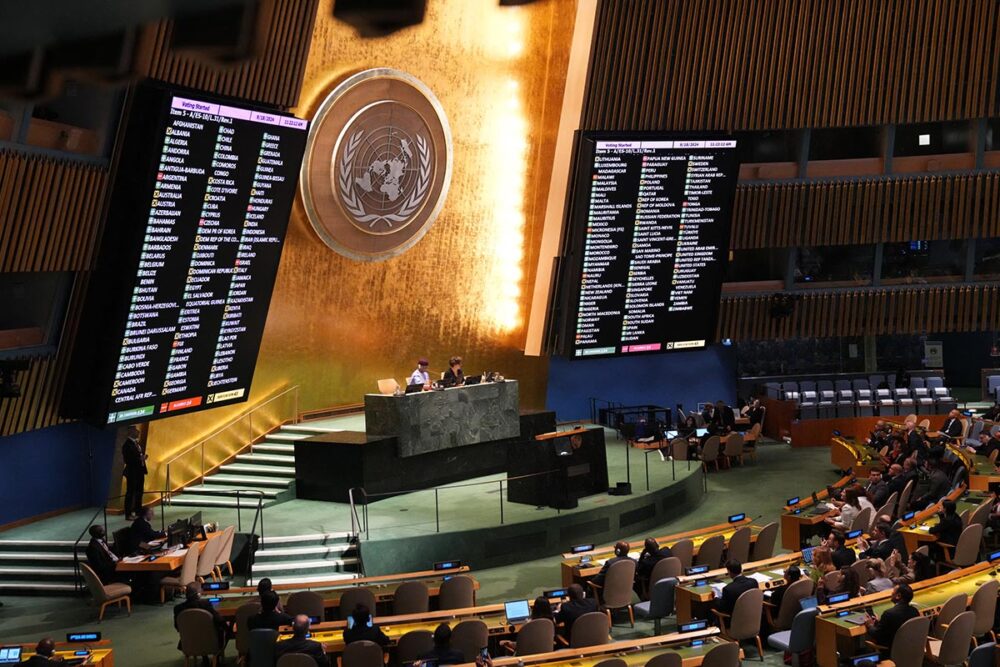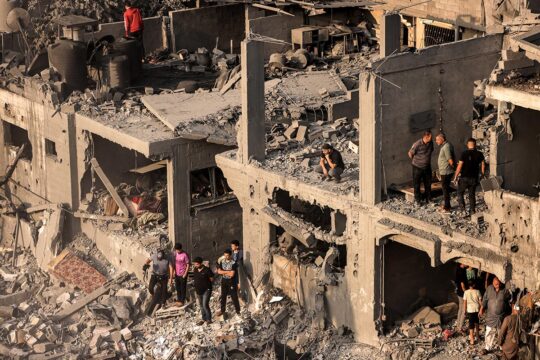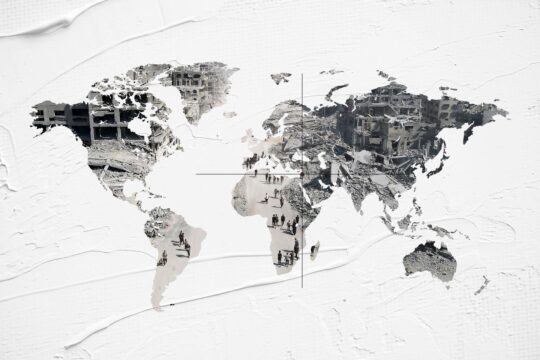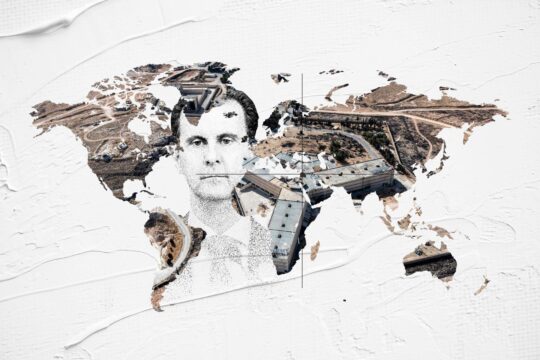The world should have come to a halt by now. With children and adults alike suffering from war, genocide, political repression, starvation, poverty, environmental disasters, gender inequality and racism, one cannot be blamed for wanting the world to grind to a halt so that it may change its course.
More than 40,000 Palestinians, most of them children and women, have been killed in the Gaza Strip in one year. The suffering is too enormous for most to comprehend, and it is too often too easy to generalize. The International Court of Justice’s characterization of what is unfolding in the Gaza Strip – a plausible case of genocide in the 21st century – has failed to trigger the necessary action to stop and prevent the violence. In the “free for all” reality set by a hardened precedence of impotence towards Israel, the violence has spilled over into neighbouring countries.
As I write these lines, the war and destruction have extended to Lebanon, Yemen, and Syria, with Israel dramatically showcasing its extensive political, intelligence and military reach, and its capability to shift the regional state of play. Missiles flew over Jordanian, Palestinian and Israeli heads, when Iran fired missiles into Israel.
The reality is not as complicated as it may seem, though. The International Court of Justice (ICJ) and the United Nations General Assembly (UNGA) recently provided leaders with a ground-breaking roadmap detailing what Israel and States must do to comply with international law and bring Israel’s unlawful presence in Palestine to an end. If correctly and promptly implemented, this roadmap can result in a return to legality and peace across the region and spare coming generations from the ravages of war and oppression.
Key takeaways from the ICJ advisory opinion
On July 19, 2024, the ICJ issued an advisory opinion on the “legal consequences arising from the policies and practices of Israel in the occupied Palestinian territory, including East Jerusalem”, at the request of the UNGA. As expected, the eminent judges opine on, inter alia, the status of the Palestinian territory, the nature of Israel’s presence and conduct, Palestinian self-determination, and the legal consequences arising for States and the UN. It scrutinizes transfers of Israelis into the occupied territory, confiscation of Palestinian land, forced displacement of Palestinians, exploitation of Palestinian natural resources, legislation adversely affecting Palestinians, and discriminatory measures. Extraordinarily, it also makes connections between Israel’s practices and policies and the changes that Israel has imposed on the Palestinian territory, allowing it to draw conclusions about Israel’s intentions towards Palestine.
By seamlessly tying together Israel’s self-serving practices and policies and its manifest “intention to create a permanent and irreversible Israeli presence in the Occupied Palestinian Territory”, the ICJ ultimately concludes that “[t]he sustained abuse by Israel of its position as an occupying power, through annexation and an assertion of permanent control over the occupied Palestinian territory and continued frustration of the right of the Palestinian people to self-determination, violates fundamental principles of international law and renders Israel’s presence in the occupied Palestinian territory unlawful.”
Several scholars and practitioners have written on the consequence, if any, of the passing of time on Israel’s status as occupying power and its legal obligations. Some have quietly questioned the relevance of international humanitarian law in the current era. Not only does the Court confirm that Israel continues to be under a legal obligation to administer the entire territory, including the Gaza Strip and East Jerusalem, in accordance with international humanitarian law, it underscores that when an occupying power fails to do so and acts in bad faith, its presence is unlawful.
Another important takeaway is the ICJ’s view on Israel’s discrimination against Palestinians, on racial, religious and ethnic grounds. Following an analysis of Israeli discriminatory legislation and measures, the Court observes that these “impose and serve to maintain a near-complete separation in the West Bank and East Jerusalem between the settler and Palestinian communities, [therefore] Israel’s legislation and measures constitute a breach of Article 3” of the International Convention on the Elimination of All Forms of Racial Discrimination (CERD). This article provides that “States Parties shall condemn racial segregation and apartheid and undertake to prevent, prohibit and eradicate all practices of this nature”. Fifteen years ago, a mere insinuation that Israel could be imposing an apartheid regime constituted political and professional suicide. Today, authoritative UN bodies do not shy away from concluding that Israel is violating the CERD, and human rights organizations confidently assert that Israel is committing the crimes against humanity of apartheid and persecution.
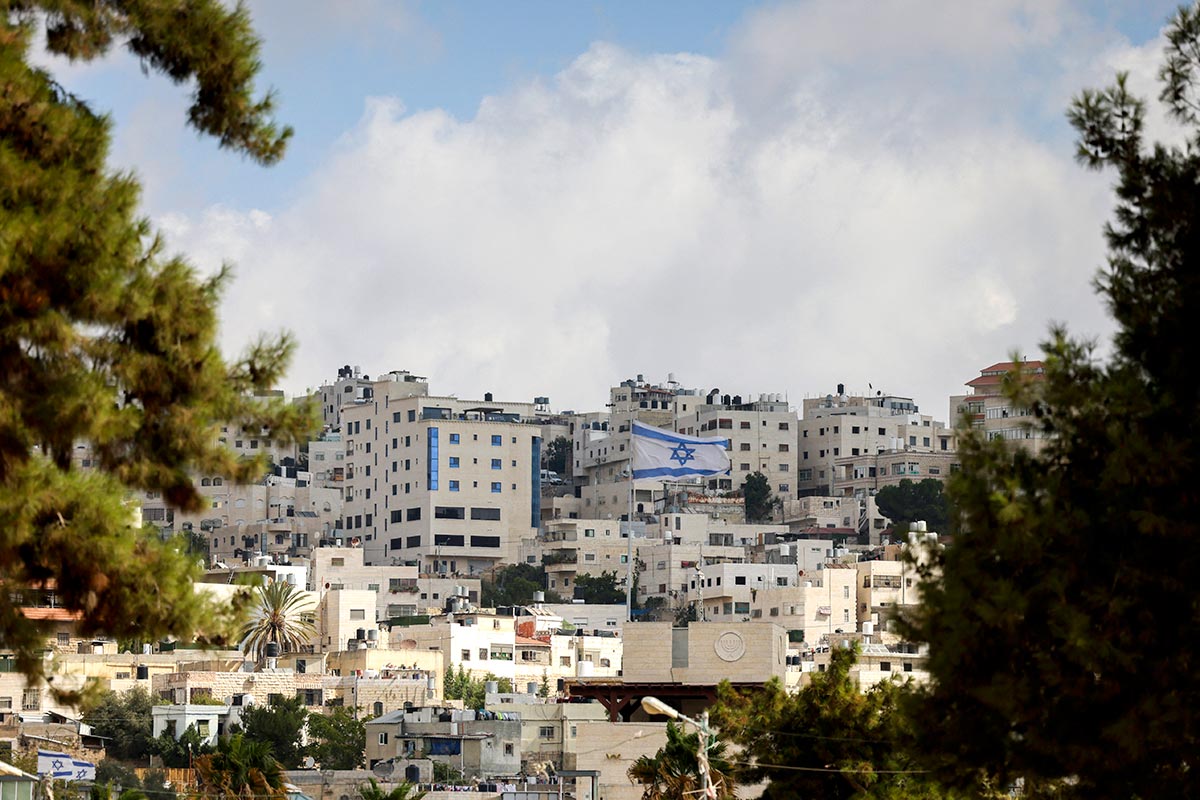
ICJ’s “to-do list”
The UNGA resolution from 2022 requesting an advisory opinion asked the World Court: “what are the legal consequences that arise for all States and the United Nations from [Israel’s] status?”
In response, the ICJ articulates in its final paragraph a simple reasonable five-step plan on what must be done: (1) Israel must bring to an end its unlawful presence in the occupied Palestinian territory as rapidly as possible, (2) Israel must cease immediately all new settlement activities, and evacuate all settlers; (3) Israel must make reparation for the damage caused to all the natural or legal persons in the occupied territory; (4) States are under an obligation not to recognize as legal the situation arising from Israel’s unlawful presence and not to render aid or assistance in maintaining the situation created by this continued presence; and (5) international organizations, including the UN, are under an obligation not to recognize as legal the situation arising from Israel’s unlawful presence in the occupied Palestinian territory.
The ICJ’s opinion that Israel must rapidly end its presence because it is unlawful contradicts States’ understanding of the occupation as a lawful yet temporary state of affairs, while waiting for a politically negotiated solution. Moreover, the call on Israel to evacuate all its settlers in the occupied Palestinian territory is at odds with a key issue of political contention; while there is broad support for Israel to stop building settlements, States’ policies have diverged on the fate of settlers already moved into the territory. Rightly so, the ICJ gives no attention to political support for settlers to remain in the territory, instead giving meaning to the phrase “a wrong cannot correct a wrong”.
UNGA deadline and expansion of roadmap
On September 13, 2024, the UNGA adopted a resolution on the ICJ advisory opinion after the ICJ held that the United Nations, especially the UNGA but also the Security Council, “should consider the precise modalities and further action required to bring to an end as rapidly as possible” Israel’s unlawful presence. The UNGA did just that: after welcoming the advisory opinion, it put a deadline of 12 months from the adoption of the resolution for Israel to bring to an end its unlawful presence, This comprises Israel’s withdrawal of military forces from both the Gaza Strip and the West Bank air and maritime space, evacuation of all its settlers, and repealing all legislation and measures that discriminate against the Palestinian people. The resolution also demands that Israel return all land and other immoveable property seized since the start of the occupation, and allow all Palestinians displaced to return to their original place of residence. The right of Palestinians to return is limited in this resolution to those displaced during the occupation, leaving out the hundreds of thousands of Palestinians who fled areas now recognised as part of the State of Israel in and around 1948.
The UNGA also gives life to the Court’s affirmations regarding third States’ legal obligations. In practical terms, the UNGA calls on all States to abstain from treaty relations with Israel in all cases in which it purports to act on behalf of the Palestinians or matters concerning them, and abstain from the establishment or maintenance of diplomatic missions in Israel. In this light, governments relocating their embassies to Jerusalem are wise to re-consider.
Relatedly, the UNGA calls on States to impose sanctions, cease the import of products originating in Israeli settlements, and abstain from economic or trade dealings with Israel which may entrench its unlawful presence. The European Union is Israel’s biggest trade partner and it has chosen to issue labelling guidelines meant to distinguish between goods originating in Israeli settlements from goods originating in Israel. The UNGA resolution affirms that labelling settlement goods is insufficient.
The UNGA resolution and ICJ advisory opinion clash with Israel’s, and other powerful States’, objectives in the occupied territory by providing a legally-founded alternative to the lifeless political negotiation framework on Israel and Palestine. It is an alternative that carries legal weight and moral ground, and avoids the power imbalances steering political negotiations. Unsurprisingly, both Israel and the United States voted against it and many European States abstained.
The five action points laid down in the ICJ advisory opinion, as well as the UNGA’s elaboration of the measures provided therein, are not for the fainthearted. They are for an international community that complies with the UN Charter and international law, including the right to self-determination and the absolute prohibition against acquisition of territory by force. These action points are for law-abiding States that value a norms-driven international community, where States guarantee the equal enjoyment of all human beings of their right to life, safety, equality, and dignity.

Nada Kiswanson is an international lawyer specialising in the prosecution and investigation of international crimes, and victim participation at international courts. She has worked extensively in the MENA region and on Israel’s occupation since 2009. She has represented around 700 Palestinian victims at the International Criminal Court. She is the co-editor of Prolonged Occupation and International Law: Israel and Palestine. She holds an LL.B and LL.M from Uppsala University in Sweden, and an LL.M from Leiden University in The Netherlands.


